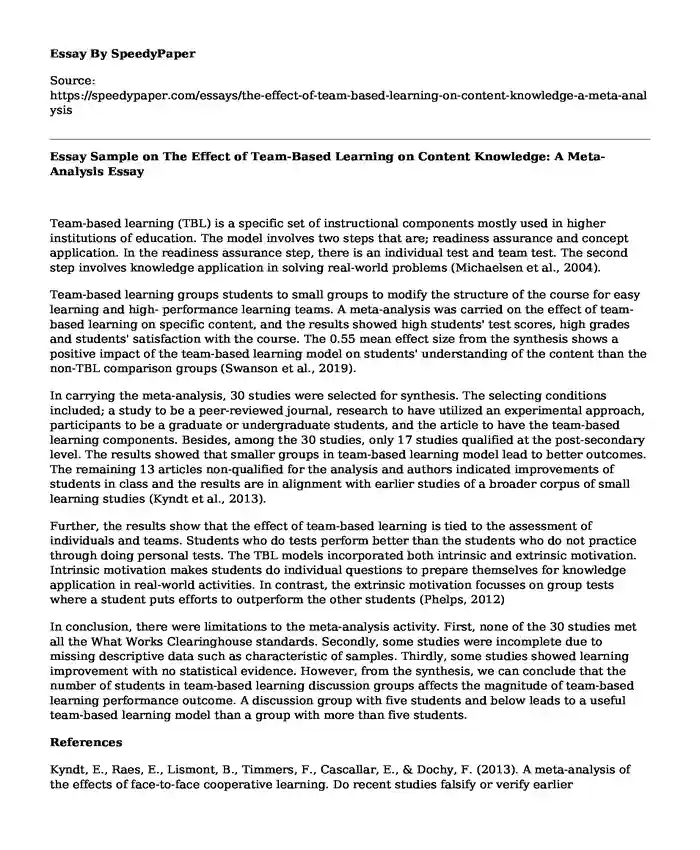
| Type of paper: | Essay |
| Categories: | Learning |
| Pages: | 2 |
| Wordcount: | 523 words |
Team-based learning (TBL) is a specific set of instructional components mostly used in higher institutions of education. The model involves two steps that are; readiness assurance and concept application. In the readiness assurance step, there is an individual test and team test. The second step involves knowledge application in solving real-world problems (Michaelsen et al., 2004).
Team-based learning groups students to small groups to modify the structure of the course for easy learning and high- performance learning teams. A meta-analysis was carried on the effect of team-based learning on specific content, and the results showed high students' test scores, high grades and students' satisfaction with the course. The 0.55 mean effect size from the synthesis shows a positive impact of the team-based learning model on students' understanding of the content than the non-TBL comparison groups (Swanson et al., 2019).
In carrying the meta-analysis, 30 studies were selected for synthesis. The selecting conditions included; a study to be a peer-reviewed journal, research to have utilized an experimental approach, participants to be a graduate or undergraduate students, and the article to have the team-based learning components. Besides, among the 30 studies, only 17 studies qualified at the post-secondary level. The results showed that smaller groups in team-based learning model lead to better outcomes. The remaining 13 articles non-qualified for the analysis and authors indicated improvements of students in class and the results are in alignment with earlier studies of a broader corpus of small learning studies (Kyndt et al., 2013).
Further, the results show that the effect of team-based learning is tied to the assessment of individuals and teams. Students who do tests perform better than the students who do not practice through doing personal tests. The TBL models incorporated both intrinsic and extrinsic motivation. Intrinsic motivation makes students do individual questions to prepare themselves for knowledge application in real-world activities. In contrast, the extrinsic motivation focusses on group tests where a student puts efforts to outperform the other students (Phelps, 2012)
In conclusion, there were limitations to the meta-analysis activity. First, none of the 30 studies met all the What Works Clearinghouse standards. Secondly, some studies were incomplete due to missing descriptive data such as characteristic of samples. Thirdly, some studies showed learning improvement with no statistical evidence. However, from the synthesis, we can conclude that the number of students in team-based learning discussion groups affects the magnitude of team-based learning performance outcome. A discussion group with five students and below leads to a useful team-based learning model than a group with more than five students.
References
Kyndt, E., Raes, E., Lismont, B., Timmers, F., Cascallar, E., & Dochy, F. (2013). A meta-analysis of the effects of face-to-face cooperative learning. Do recent studies falsify or verify earlier findings?. Educational Research Review, 10, 133-149.
Michaelsen, L. K., Knight, A. B., & Fink, L. D. (2004). Team-based learning: A transformative use of small groups in college teaching.
Phelps, R. P. (2012). The effect of testing on student achievement, 1910–2010. International Journal of Testing, 12(1), 21-43.
Swanson, E., McCulley, L. V., Osman, D. J., Scammacca Lewis, N., & Solis, M. (2019). The effect of team-based learning on content knowledge: A meta-analysis. Active learning in higher education, 20(1), 39-50.
Cite this page
Essay Sample on The Effect of Team-Based Learning on Content Knowledge: A Meta-Analysis. (2023, Dec 15). Retrieved from https://speedypaper.com/essays/the-effect-of-team-based-learning-on-content-knowledge-a-meta-analysis
Request Removal
If you are the original author of this essay and no longer wish to have it published on the SpeedyPaper website, please click below to request its removal:
- Solve Your Academic Problem with Honor, Free Essay Describing Personal Experience
- Learner Autonomy Research, Free Essay Sample
- Parents Supporting Reading Today - Learning Essay Sample
- Free Essay on the Role of Communication in a Consultative-Collaborative Model
- Free Essay: Successful Student Reflection
- Paper Example: Bloom's Taxonomy
- Transforming Organizational Dynamics: A Journey from Tradition to Learning - Free Paper
Popular categories




